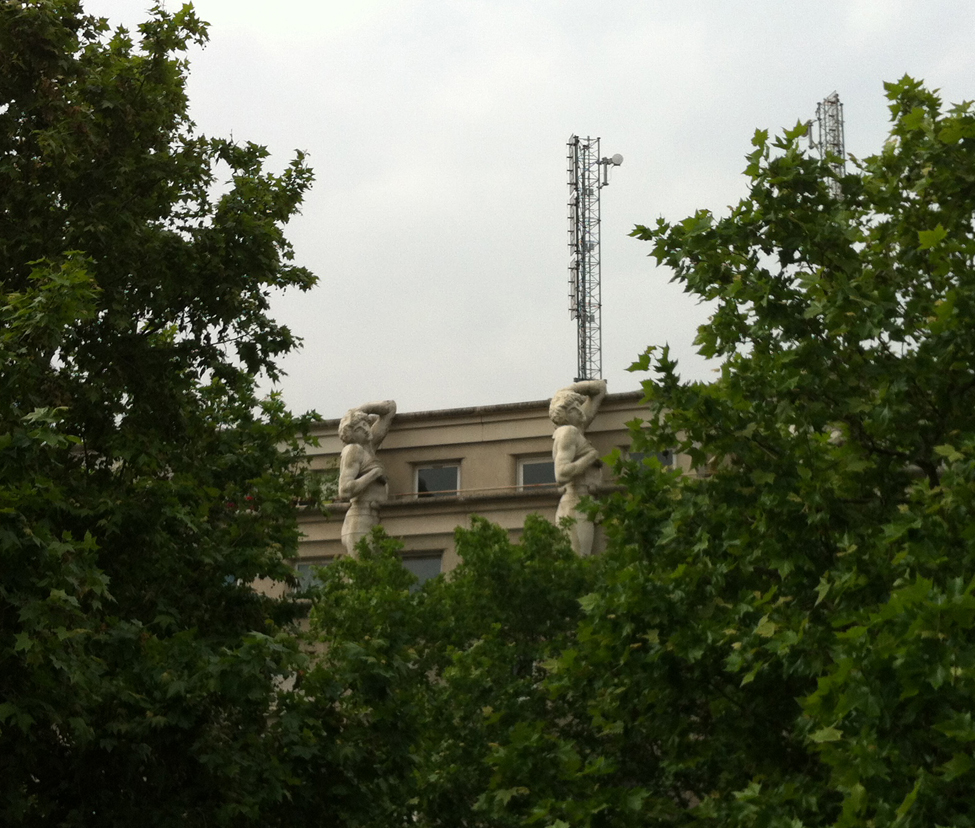XXXVIII
Is there something in the process of penetrating and being penetrated by a written text that allows one to weave oneself a strand deeper into the cosmos?
Where is the intersection point between written and all other “texts”?
Does a text remain discrete when it enters us? Or does it, even in its distinction, become part of a relational web of images that we have collected from our first moments of sensation? Does it, at length, become entirely dispersed?
When we make a text, does some part of it penetrate the world as it leaves us?
What we are witnessing in the breakdown of signification systems, and even of our capacity to signify, is the collapse of everyday mind. That this collapse is unintended, often feared, and widely deplored and mourned, does not make it any less useful toward the eventual reconstitution of meaning at another level.
What Ezekiel saw.
What Pinchas sewed.
Who is this Ana Tomy, and why is she destiny?
Just after the spring equinox calendrically banished the harshest of harsh Gotham winters, even as the daffodils and crocuses boldly assert their air rights, the New York Post reports that:
“The city is quietly preparing to move more than 8,000 unidentified body parts to their new resting place in the 9/11 Museum.
‘We’re getting ready,’ said city Medical Examiner’s Office spokeswoman Julie Bolcer. ‘We’re planning the move.’
Lee Ielpi, whose firefighter son, Jonathan, died on 9/11, said the remains should be moved in a solemn motorcade ‘with clergy of all religions to show the world how we treat our dead, murdered on 9/11, with respect and dignity.’ [Interesting that the Post editor didn’t catch that odd sentence construction.]
The ‘remains repository’ will be hidden from view behind a wall engraved with a quote by Virgil: ‘No day shall erase you from the memory of time.’ The space will include an ME’s office, to continue DNA-ID efforts, and a family visiting room.
Some 9/11 relatives strongly oppose putting the remains in the museum – which will charge $24 for admission – saying visitors should not have to fork over cash to pay their respects.”
Ay, sí, por cierto. Pero hay otros problemas con el museo de la memoria también, incluyendo the old quote-out-of-context pitfall, one which Caroline Alexander, a writer on the classics, and a careful reader, pointed out two years ago in a Times op-ed. Alexander wrote in response to the announcement of the Aeneid line as the WTC destruction’s tomb-sealing epigraph:
“Virgil’s epic relates the trials of the unhappy Trojan hero Aeneas, who, as Troy burns, flees with the remnants of his family and people to his ships and the sea, eventually winding up in Italy, where it is his destiny to lay the foundation of what will become Rome.
The immediate context of the quotation is a night ambush of the Rutulian enemy camp by two Trojan warriors, Nisus and Euryalus, whose mutual love is described in terms of classical homoerotic convention and whose deaths represent one of the epic’s famously sentimental set pieces. Falling on the sleeping enemy, the two hack away with their swords, until the ground reeks with ‘warm black gore.’ Stripping the murdered soldiers of their armor, the two are in turn ambushed by a returning Rutulian cavalry troop. As each Trojan tries to save his companion, both are killed, brutally and graphically. At this point the poet steps in to address them directly:
“Fortunati ambo! si quid mea carmina possunt, nulla dies umquam memori vos eximet aevo.”
“Happy pair! If aught my verse avail, no day shall ever blot you from the memory of time.” (The translation here is from the famously literal Loeb edition.) At dawn’s light, the severed heads of the two Trojans are paraded by the enemy on spears…
It is no easy duty to commemorate the dead. Possibly others have performed it worse, and at least some, worth studying, have done better. In Britain, the dreadful task of fixing an inscription for the million military dead in the wake of World War I fell to Rudyard Kipling – a task made especially delicate given the loss of his own son in the war. The simple quotation he selected, ‘Their name liveth for evermore,’ reflects the same pledge of determined remembrance as the 9/11 memorial effort. But whereas the Virgilian quote dissolves on inspection, Kipling’s choice, from the 44th chapter of Ecclesiasticus, becomes more profound as its context becomes clearer.
‘Let us now praise famous men,’ begins that chapter of Ecclesiasticus, but it in fact goes on to evoke those who died obscurely, as well as those who died having performed great deeds; both will be remembered by their descendants. A long work, Ecclesiasticus is sure to hold something jarring for everyone; but overall, in context, the selected verse remains sound:
‘Their seed shall remain for ever, and their glory shall not be blotted out. Their bodies are buried in peace; but their name liveth for evermore.’”
True enough, but then there is the unsustainable Superlative Tense. In which we sons and daughters of Greeks, and Trojans, are still prone to in our utterances.
And is part of what makes Ecclesiasticus “jarring” the absence of even one woman among the famous and unknown persons praised in the biblical apocrypha also known as the Book of the All-Virtuous Wisdom of Joshua ben Sira?
He threw the door ajar.
And much to his surprise, the door threw it back.
Space. Paces.
Jarring Joe has left and gone away.
…Sleepin’ in the shade
With a diamond on his ring
Was a home boy lion
Who thought he was a king
He was a daddy
But he was only seventeen
He was broke
But he was always clean
He could read
But he couldn’t read right
He could write
But he couldn’t write right…
So goes the late Sekou Sundiata’s telling of “The Signifying Monkey,” who now enters the scene to set the lion against the elephant – ‘cause children, that’s just what monkeys do. You better watch what you say.
A wonderful version of this tale can be heard in Sekou’s collaboration with the legendary blues guitarist and songwriter Michael Hill and his band on the album Bloodlines.
Egotism. Ergotism.
Two brands of hallucination.
Bells of Saint-Médard ring me in.
Freedom and love are two ways of talking about the same thing.
As I wrote this book, the rogue’s cap of the Yiddish Purim play hovered always before my eyes.
Said Itzik Manger, “the master tailor of words,” in his introduction to Itzik’s Midrash.
New word, recently heard: “Glec(k),” a noun. Yiddishized coinage based on “neglect,” but meaning its opposite: caring attention. E.g.: “Not to worry, you can always call me and I’ll give you gleck.”
Thirdish world.
A dog starv’d at his master’s gate
Predicts the ruin of the state.
Says Blake.
The circus and the audience are absolutely indispensable to the hygiene of the state.
Says Baldwin.
The pores of deception.
A terrified people can have no history.
Terror incapacitates memory and shuts down the present.
History, I contend, is the present – we, with every breath we take, every move we make, are history.
Says Baldwin, in The Evidence of Things Not Seen.
The present, yes. As it intersects with accumulated memory.
And what precisely is it that stays with us, in place of memory – as if it were memory! – when terror forces us to repudiate memory?
Keys to the city: one for each of the twelve gates.
Major or minor, depending on how they are played.
My memory stammers: but my soul is a witness.
Says Baldwin.
Greek mythology celebrates Mnemosyne, the goddess of memory, as the mother of all art. She bore the nine muses to Zeus. Centuries after the origin of this myth, Plato banned poetry, the child of memory, from his ideal state as being idle and seductive. While lawmakers, generals [strategoi], and inventors were useful for the common good, the fact that Homer was nothing but a wandering minstrel without a home and without a following proved how useless he was.
From Ernst Schachtel, “On Memory and Childhood Amnesia,” in Metamorphosis. New York: Basic books, 1959.
The world is full of subtle, mysterious energics.
And little wheels, micro turbines, that move everything.
Every big thing is an ensemble of small things.
The World Trade Center: where the phallic manifests the absolute non-erotic.
Search everywhere downtown and you will find Aphrodite conspicuous in her absence, avoiding the place like the plague, even as Liberty rises, but is hardly born, out of the sea.
When Aphrodite withdraws her blessing, every Galatea returns to stone. And Pygmalion flattens his persistent cock flat with his sculptor’s hammer.
I tell you, children, when Eros deserts the zero’d ground, the only two who’ll enter are Phobos and Timor, arm in arm as always, locked in step, in their hobnail boots, excited by the smell of death.
In the absence of the transmissible, Hermes buttons his lip and turns away.
Croissants for breakfast at Café Fuck Vauban.
Honey, you been propitiating the wrong gods.
Birds crash in where angels fear to spread. And the innocent clouds impale themselves on spires before engulfing them. But then, they are immortal…
What New York harbor needs is reclamation.
So bring back the clams.
What if courage went viral?
What if it went spiral?
For the artist, eros turns to anatomy, turns to eros informed by anatomy, turns to structure infused with eros, turns to…
All I’m really sure of is that Idontknow’s on third.
If this were Rome, we’d all be wearing togas – hello!
Old guy
Forgot to pull up fly.
The five colors confuse the eye,
The five sounds dull the ear,
The five tastes spoil the palate.
Excess of hunting and chasing
Makes men’s hearts go mad.
Products that are hard to get,
Impede their owner’s movements.
Therefore the Sage,
Considers the belly, not the eye,
Truly, he rejects that but takes this.
—Laozi, via Arthur Waley in The Way and Its Power.


